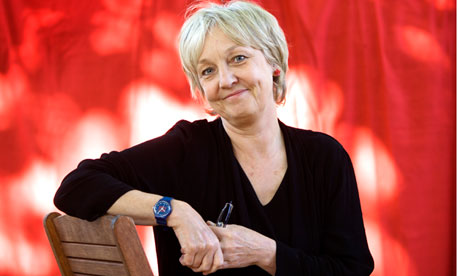
The eccentric family drama has been a compelling fictional formula since Little Women, and Natasha Farrant's After Iris (Faber £6.99) has the wit and charm of Hilary McKay's Exiles books with the added emotional depth of Annabel Pitcher's My Sister Lives on the Mantelpiece. Since the death of 13-year-old Bluebell's twin sister, her parents have poured themselves into their work, frequently leaving Blue and her siblings with their Bosnian au pair, Zoran. Blue records on film her grief, her unrequited love for the boy next door and her bullying by her former best friend, with her mini-screenplays capturing moments of comedy and tragedy. Highlights in a touching study of family life are Blue's spiky and tender relationship with her older sister and chief rival, and Zoran's care beyond the call of duty for his charges, who begin to understand his own troubled past.
Blue's family chaos appears picturesque and resolvable next to Eddie's in Anne Fine's Blood Family (Doubleday £12.99). Imprisoned in a squalid flat with his abused mother, Eddie seizes on vintage children's TV for parenting, education and life skills. Mother and son are separated after rescue by social workers, and while the established system of fostering, adoption, counselling and school offers Eddie a second chance at childhood, rehabilitation is elusive. The multiple narratives of the professionals and carers involved in Eddie's future, with the notable absence of his mother's voice, reflect the fragmentation of a vulnerable individual's world. Eddie reveals in his own voice how the most apparently disinterested parties, such as his straight-talking, belligerent adoptive sister, can make the most effective difference simply by sticking around. Blood Family is realistic about what can and can't be healed but ends on a hopeful note with a young adult Eddie about to take control of his recovery.
If You Find Me by Emily Murdoch (Indigo £8.99) is another tale of slow recovery from early abuse, narrated by Carey, who takes care of her younger sister while living rough with their drug-addicted mother in a corner of a Tennessee national park she calls "Hundred Acre Wood" in a grasp at conventional childhood. When the girls are rescued by Carey's father and absorbed into his new family, her adjustment to home comforts and the social minefield of high school is erratic. Sustained by books, music and new friends, she reconstructs the most painful chapters of her past but also some of its joys. Unlike Blood Family, Carey's story is sustained by her own narrative voice, engaging enough to draw the reader through difficult material. Both novels will comfort teenagers who had an unpromising start in life and enlighten those more fortunate.
If You Find Me is a striking debut novel, as is Alexia Casale's The Bone Dragon (Faber £9.99). Casale also examines an adopted teenager's recovery from past trauma, adding an element of fantasy. When Evie has her shattered ribs removed, her uncle helps her carve a dragon from her own bones. The dragon, representing her own inner strength, takes her on after-dark expeditions to do battle against her foes. The metaphor is not overlaboured and the dragon breathes fire into the fantasy adventure episodes, which have a flavour of Alan Garner.
Winter Damage by Natasha Carthew (Bloomsbury £10.99) is also a first novel, introducing a resourceful teenage heroine in bitter circumstances. This gripping quest tale is set in Cornwall in a near future suffering the effects of climate change and social collapse. Ennor sets out across the frozen moors to bring her mother home for Christmas, learning survival skills and the meaning of friendship from a gypsy girl and eventually joined by her younger brother and a childhood friend. Ennor makes a series of commitments and tough choices en route to an ending that just about transcends bleakness.
The first novel published by Malorie Blackman since she became children's laureate will be eagerly scrutinised. Noble Conflict (Doubleday £12.99) is a powerful thriller embracing a thoughtful examination of propaganda and how concepts such as heroism, terrorism, sacrifice and a just war are constructed. Kaspar, a farm boy recruited to his country's elite peacekeeping force, buys wholesale his commanding officers' account of the evil Insurgents kept at bay without bloodshed by the righteous Guardians, until he encounters his first "terrorist".
The Guardians' barrack-room banter could be straight from British soldiers heading for Afghanistan. These scenes, and the scrapes Kaspar gets into as he wanders off-piste on his early missions, lighten the harrowing material to come. When Insurgents kill his buddy and Kaspar's dreams stray into "enemy" territory, it becomes clear that truth is the peacekeepers' first casualty and asking questions a dangerous pursuit.
Monkey Wars by Richard Kurti (Walker £7.99) delivers more on the art of war and the trials of forming bonds across battle lines. Readers who might be drawn to Watership Down but prefer a faster pace will relish the antics of the monkey tribes of Kolkata. The Langur have built up a military machine, with corrupt leadership. The Rhesus have been ousted from their home by the Langur. A young Langur monkey becomes a whistleblower after witnessing his first bloody attack. An exciting plot with an occasionally flat style.

